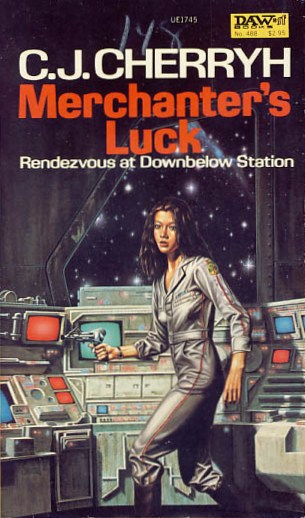 If space is an ocean and interstellar colonization is happening on a grand scale, then it should come as no surprise that so many starship captains are intrepid merchants, traveling the galaxy in pursuit of a good business deal. Whether they’re doing it legally as entrepreneurs or illegally as smugglers, you can find these guys in almost any space opera, from Star Wars and Star Trek to Firefly and Foundation.
If space is an ocean and interstellar colonization is happening on a grand scale, then it should come as no surprise that so many starship captains are intrepid merchants, traveling the galaxy in pursuit of a good business deal. Whether they’re doing it legally as entrepreneurs or illegally as smugglers, you can find these guys in almost any space opera, from Star Wars and Star Trek to Firefly and Foundation.
Ever since Marco Polo and Sindbad the Sailor, intrepid merchants have played a major role throughout history. The brave adventurers who travels to exotic locales to bring you all the best deals, these are often the guys at the forefront of exploration and expansion. After all, Columbus sailed the ocean blue to find a better trade route to India–discovering a new world was just a side benefit. The British Empire had its origins in mercantilism, forming the empire to protect their trade routes (and later, to secure markets and resources for their industrialized economy).
Unlike their real-world counterparts, however, space merchanters have a lot more challenges to contend with than sandstorms and bandits. Science fictional universes are teeming with all sorts of exotic dangers, from black holes and solar flares to space pirates and strange alien races. Unless FTL communication is in force, the immensity of space often makes it impossible to know exactly what to expect on your next FTL jump. And then there’s all the normal space stuff, like busted airlocks and critical failures in the oxygen recyclers.
The best stories, though, are the ones that world build their merchanters to the point where they form their own distinct society. This may overlap with the proud merchant race, though IMO it works best when it’s more than just a hat that everyone wears. The merchanters from C.J. Cherryh’s Alliance-Union universe are a great example, where the entire society has restructured itself around the nomadic spacefaring lifestyle. Another is Heinlein’s Citizen of the Galaxy, where the free traders have developed a strict social hierarchy that defines everyone’s role in running the spaceships.
Since space-centered science fiction largely grew up in the Cold War era, I wonder how much of this trope stems out of the clash between communism and capitalism. The original Star Trek certainly shows a lot of Cold War influences, with the Klingons originally playing proxy for the Russians. Is the genre’s fascination with the adventurous space merchant somehow an outgrowth of that world-shaping conflict? And if so, how do the stories differ on the Soviet side? It makes me wish I could read Russian, since the Soviets certainly had their own fascination with science fiction and space opera.
In my own work, this trope plays a central role. Most of the major characters in my stories are merchants of one stripe or another. James McCoy from Bringing Stella Home is the son of a merchanter, and comes from a mining colony where interplanetary trade drives the local economy (setting up the conflict for Heart of the Nebula after the Hameji take over).
But the trope takes special prominence in my Star Wanderers novellas, which was largely a reaction to C.J. Cherryh and Heinlein. I wanted to create a spacefaring society on the starbound frontier that revolved not only around trade and colonization, but much more personal struggles like finding love and fighting loneliness. In that sense, the stories are a lot more like Merchanter’s Luck than Downbelow Station–more about the lives of individual characters than the grand sweep of galactic history.
Either way, I’m a big fan of this trope. If you’ve got any examples from your favorite books, please share! Wish-fulfillment is a huge part of any fictional genre, and science fiction is no exception. If I could leave it all behind to become a merchant to the stars, you can bet I’d do it in an instant!
